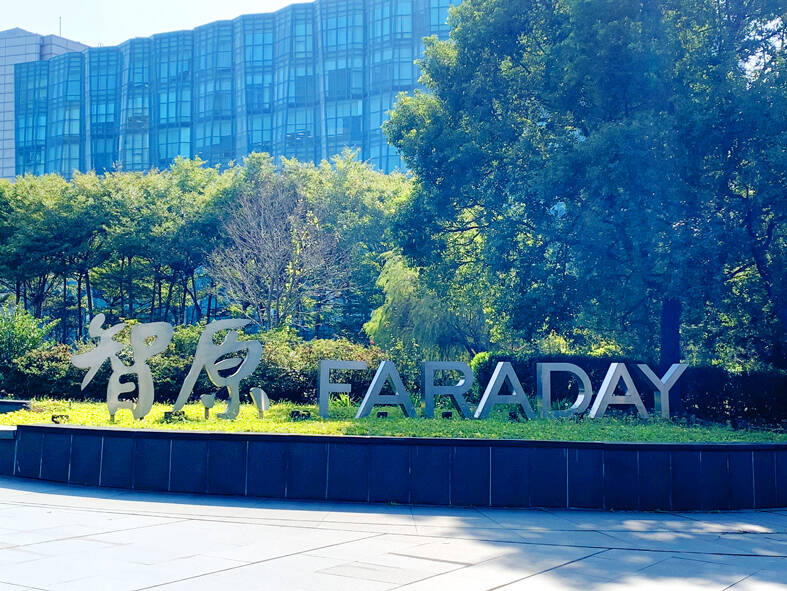Application specific integrated circuit (ASIC) designer Faraday Technology Corp (智原) yesterday raised its projected revenue contribution from artificial intelligence (AI) related business to a high single digit this year, driven by robust demand for advanced 2.5D packaging technology, and expects growth to further pick up next year with more AI chips entering mass production.
“AI products are the major driving force this year in terms of NRE [non-recurring engineering] and MP [mass production],” Faraday president Steve Wang (王國雍) told investors during a virtual conference.
Faraday, which mainly offers advanced packaging design services for AI chips, secured its first AI project at the end of last year, the company said.

Photo: Grace Hung, Taipei Times
The firm designs the interposer — a key structure providing electrical connection between chips and components inside the 2.5D packaging.
Foundry service provider United Microelectronics Corp (聯電) produces this interposer before handing it over to chip packagers.
Faraday is leveraging its partnership with Arm Holdings Ltd to expand into AI. The firm last year became the only ASIC company picked by Arm to become a partner for its Neoverse subsystems.
Faraday expects revenue this year to return to the growth track, after sliding 8.42 percent last year as customers grappled with a prolonged inventory correction cycle, Wang said.
A spike in NRE revenue would help cover the weakness in MP revenue, which would drop by about 20 percent this year, Wang said.
NRE revenue would at least double this year, after climbing 1.6 percent annually to a record-high of NT$627 million (US$19.24 million) in the first three months of the year, he said.
ASIC companies usually generate revenue from collecting NRE, the one-time cost to research, design, develop and test a new product or product enhancement, intellectual property (IP) license, or royalty and revenue after the chips they designed enters mass production.
Faraday’s growth would also be fueled by expanding its business to advanced chips made on 5-nanometer, 4-nanometer or 2-nanometer technology through its collaborations with foundry partners Samsung Electronics Co and Intel Corp.
The company expects consolidated revenue to grow by a low-single-digit percentage this quarter compared with NT$2.58 billion last quarter, led by NRE revenue, which would grow by a double-digit percentage, while IP revenue would increase by a single-digit percentage.
MP revenue would shrink by a low-single-digit quarterly due to inventory digestion, it said.

Semiconductor business between Taiwan and the US is a “win-win” model for both sides given the high level of complementarity, the government said yesterday responding to tariff threats from US President Donald Trump. Home to the world’s largest contract chipmaker, Taiwan Semiconductor Manufacturing Co (TSMC, 台積電), Taiwan is a key link in the global technology supply chain for companies such as Apple Inc and Nvidia Corp. Trump said on Monday he plans to impose tariffs on imported chips, pharmaceuticals and steel in an effort to get the producers to make them in the US. “Taiwan and the US semiconductor and other technology industries

SMALL AND EFFICIENT: The Chinese AI app’s initial success has spurred worries in the US that its tech giants’ massive AI spending needs re-evaluation, a market strategist said Chinese artificial intelligence (AI) start-up DeepSeek’s (深度求索) eponymous AI assistant rocketed to the top of Apple Inc’s iPhone download charts, stirring doubts in Silicon Valley about the strength of the US’ technological dominance. The app’s underlying AI model is widely seen as competitive with OpenAI and Meta Platforms Inc’s latest. Its claim that it cost much less to train and develop triggered share moves across Asia’s supply chain. Chinese tech firms linked to DeepSeek, such as Iflytek Co (科大訊飛), surged yesterday, while chipmaking tool makers like Advantest Corp slumped on the potential threat to demand for Nvidia Corp’s AI accelerators. US stock

The US Federal Reserve is expected to announce a pause in rate cuts on Wednesday, as policymakers look to continue tackling inflation under close and vocal scrutiny from US President Donald Trump. The Fed cut its key lending rate by a full percentage point in the final four months of last year and indicated it would move more cautiously going forward amid an uptick in inflation away from its long-term target of 2 percent. “I think they will do nothing, and I think they should do nothing,” Federal Reserve Bank of St Louis former president Jim Bullard said. “I think the

SUBSIDIES: The nominee for commerce secretary indicated the Trump administration wants to put its stamp on the plan, but not unravel it entirely US President Donald Trump’s pick to lead the agency in charge of a US$52 billion semiconductor subsidy program declined to give it unqualified support, raising questions about the disbursement of funds to companies like Intel Corp and Taiwan Semiconductor Manufacturing Co (台積電). “I can’t say that I can honor something I haven’t read,” Howard Lutnick, Trump’s nominee for commerce secretary, said of the binding CHIPS and Science Act awards in a confirmation hearing on Wednesday. “To the extent monies have been disbursed, I would commit to rigorously enforcing documents that have been signed by those companies to make sure we get